- Home
- Nevil Shute
Vinland the Good Page 2
Vinland the Good Read online
Page 2
CALLENDERHe saw it, but he didn’t land—and there were other reasons, too. I’ll tell you about him in a minute. Now, does anybody know who first explored the United States—the first that we have any record of?
(Dead silence.)
—Well, it was first explored by two young Scots, about the year one thousand and three, in the summer. They were a young man and a young woman, Haki and Haekia, born at Aberdeen or Inverness on the east coast of Scotland. I rather think they went there for their honeymoon.
(The class is now definitely interested. Callender turns and writes upon the blackboard Haki and Haekia. )
BOY FOURDid they go to Niagara Falls, sir?
CALLENDERNo. As a matter of fact, they went to Cape Cod.
BOY ONE(Doubtfully) It says John Cabot in the book, sir.
CALLENDERThen the book’s wrong. I’m telling you what happened.
(In the next room the Headmaster is looking very sour. In the classroom Callender leans forward on his desk; he now has the attention of the class.)
CALLENDERIt all began about twenty years before, when a chap called Eric the Red got chucked out of Norway for manslaughter. He was a berserk.
BOY TWOWhat’s a berserk, sir?
[DISSOLVE TO:
Hillside in Norway
(This dissolve should take place very slowly to a scene of violence in wild Norwegian country. From now onwards Callender’s voice will be used as a commentary when required. This dissolve should last as long as the following speech.)
CALLENDERA berserk was a sort of gangster tough, a regular bad lot. The sort of man who kidnapped another fellow’s wife and carried her away into the hills and lived with her. Then when the husband came to get her back the berserk worked himself up into a fighting rage and killed the husband in battle. This chap Eric had red hair, and he always fought in a mad fury, and he fought a lot.
(The dissolve gradually discloses a dead man lying on the ground. Eric the Red is standing over him with a blood-stained battle axe; his anger has now cooled, and he does not know quite what to do next. He is an enormous, violent man, but in later life he made a number of loyal friends, so there must be an attractive side to him.)
(In the background, by a mean hovel on the hillside which may be rather like an Irish turf cottage, there is a Woman weeping.)
(The dissolve is now complete. Eric picks up his axe and crosses uncertainly to the Woman and touches her on the shoulder.)
WOMANDon’t touch me. I never want to see you again.
ERICI think we will go away now, far from here, to some other place.
WOMANI thought that would be the next thing. Go on, then. Run away and hide. You’ve done that before.
ERIC(Uncomfortably) It will make less trouble if we go away for a bit. I will take you with me.
WOMANIf you force me to come with you, I will tell the story of this murder everywhere you go.
ERICIt wasn’t murder. He attacked me first. A man has a right to defend himself.
WOMANThere is justice in this land, and you will not escape it.
ERIC(Irritably) Stop snivelling, unless you want a beating.
[DISSOLVE TO:
The Thingplain
(This was a wide, open, grassy space in front of the temple. The Thing was an assembly of the people; it was half parliament and half religious in character. It was presided over by the temple priest, the Godi, who was assisted by a council of elders known as Thingmen. The Godi always had a long beard.)
(This is an open air scene of rough, primitive people in wild scenery. They have come together to deliver justice according to their well-defined code of laws.)
ERICDon’t keep on talking about murder. He attacked me first. I was just defending myself.
GODIBut you had his woman.
ERICA woman has the right to change her man. She stayed with me willingly, after the first day or two.
GODIThat is so, but her new husband must pay compensation for the damage he has done in taking her. Did you offer to do so?
ERIC(Loftily) I am a man of ideals. I do not buy and sell my women.
GODIThat’s not a straight answer. Did you pay compensation for this woman, according to our law?
ERICI am a wandering man; I have no farm and no property. I would have paid him some day, when I got some money.
(There is a murmur in the crowd, and a surge of discontent.)
GODICan you pay compensation for this man that you have killed, in order that his relatives may be appeased?
ERIC(Angrily) Don’t keep on at me. I have told you that I am a poor man; I’ve had a lot of bad luck recently. I will do what I can.
GODIIf you cannot pay compensation, or if you will not, the relations of this man may hunt you down and kill you. They may take your life in payment for the life that you have taken. This is our ancient law.
A MAN IN THE CROWDAy, and we’ll see that the law is kept this time. We’re fed up with this.
ERIC(Fiercely, loosening the axe at his belt) I am a man of peace. I’m not a man who goes round picking quarrels. But if any of you lawyers comes to trouble me I’ll hack him in two pieces at one blow and throw the pieces to the ravens.
(There is a hostile roar from the crowd.)
GODISilence, all of you. We will not have a battle raging through our country; we have had enough of that. Lawman, what is our first law?
(The Lawman steps forward. This is a very old, venerable man, the most respected man in the community after the Godi. His duty was to know all the laws by heart, and to recite them on occasions such as this.)
LAWMANIt is the first law of our man-holiness that every man of the country shall be peace-holy, both at home and abroad.
(There is a respectful murmur of assent from the crowd.)
GODI(Turning to the Elders) Thingmen, my advice to you is this. If we keep this man Eric in this country we shall have blood feuds according to our law, and no man will be able to work safely in his fields. I say that this man is a bad man. He will never be peace-holy. He makes continual trouble for us and he does no work; he is useless to our country. Therefore, I think that he should be an outlaw, and his father Thorvald with him, who is just as bad. I say that they should get out of this country in one week from now. If they don’t go, then I think that every man should stop his work and take up arms, and hunt them down till they are killed like dogs. Thingmen, what do you say to that?
(There is a roar of assent from the crowd. The Thingmen, standing a little apart, consult together for a moment, and then nod their heads.)
ERICThat’s no punishment, to leave a pettifogging place like this. You’re so tied up with conventions and restrictions here that a man can’t breathe. I shall go westwards, over the seas to the great open spaces where men are men and not little creeping rats.
(There is an angry murmur from the crowd.)
—I shall go to Iceland, and to hell with all the lot of you.
(He turns, spits on the ground, and stalks out of the Thingplain with some dignity.)
[DISSOLVE TO:
The Classroom
(Callender turns to a map of the North Atlantic on the wall and indicates on it with a billiard cue.)
CALLENDERThis is Norway, where they started from, and they were going to Iceland, here. They had no compass to steer by; the magnetic compass came from China later on. But they could find their way about the seas all right. What they did was this—
[DISSOLVE TO:
The Ship
(The scene is in the ship, where the action is in accordance with Callender’s commentary; the Captain of the ship is measuring the length of the shadow on the thwart, very serious and intent.)
CALLENDERThey navigated by an observation of the sun at noon. Each day at noon they laid the ship at right angles to the sun and marked the length of the shadow of the bulwark on a thwart; that gave them a rough measure of the latitude. They carved notches on the thwart for the latitude of places they knew. This ship had a notch already carved for the
latitude of northern Iceland, so they—
[DISSOLVE TO:
The Classroom
(Callender is indicating the track of the ship on the map.)
CALLENDER—sailed north at first until they got to the latitude of northern Iceland, and then they sailed westwards along it till they got there—here. I’m telling you all this because it’s important to the story later on. You see, a ship could only sail accurately to a place that she had been to before, where they had cut the notch upon the thwart.
[DISSOLVE TO:
The Bow of the Ship
(Showing a close-up view of the dragon figurehead.)
CALLENDERThe common people thought it was because the dragon on the ship would know the way back to a place he had been to before. They were very superstitious.
[FADE TO:
A Hillside in North Iceland
(From this hillside, one looks down onto a plain; there are two rough farms upon this plain, clearly divided by a stone wall. There is a hill stream running down and through one farm; the other has no water.)
(Eric and two of his thralls are standing by this stream with spades, picks, and wooden crowbars.)
ERICThis is the place I mean. The Gods do not make rain so that Eyiolf and Hrafn can have the lot of it, and we none at all. Odin was not thinking when he made the course of this stream.
THRALL ONELord, you were in Norway when Odin made this stream. No one lived upon your land because it had no water.
ERICAll land has a right to water. (Threateningly) That’s true, isn’t it?
THRALL ONE(Quickly) Yes, Lord.
ERICVery well, then—get your spade and start digging. If you dig a channel through this spur here, first, the stream will go our way when it is dammed. Then we will make this little landslide, here; if we prize out this stone, the earth will fall. Then we shall have water on our land, as Odin meant us to have it.
[DISSOLVE TO:
The Hillside—Later
(The Thralls have done a lot of digging, and a new channel is now clear for the stream. Eric and the Thralls are working with wooden crowbars to loosen a great stone; presently it falls and dams the stream. Eric is very pleased, and goes down onto his land to direct the new flow of water.)
[CUT TO:
Eyiolf’s Farm
(This is a very rude hovel, stone walls and thatch; there is a similar barn near by. A Woman comes out of the door of the farmhouse and looks at the stream which runs by; it has gone dry. There should be fish flapping about in a shallow pool to indicate the suddenness of the occurrence. The Woman runs to the barn and calls the Two Men.)
WOMANAll the water has gone!
(The Men stare at the stream, and then up to the hillside where the Thralls are still working. They turn and grab weapons, and start running up the hill.)
(Eric, working with the water on his own farm, hears the sounds of battle; he looks up to the hillside and sees the Two Men fighting with his unarmed Thralls; as he watches one of them falls to the ground. Eric is wearing his axe; he pulls it from his belt and starts running to the scene of the fight.)
[CUT TO:
The Hillside
(Eric comes up in a mad fury; both his men are dead or dying. He rushes in in a fighting rage and kills one of the attackers with a single blow of his axe. The other flees across country; Eric rushes after him and kills him as he runs, after a wild chase. This is a scene of mad violence and fury.)
[DISSOLVE TO:
Thingplain in North Iceland
(This scene is generally similar to the Thing scene in Norway, though the detail should be sufficiently different.)
ERICThese men attacked my thralls and killed them both. It is the law that a man should protect his own thralls. That’s all I did.
GODIIt is the law that a man should be peace-holy. What is this story that I hear about the stream?
ERICThere was no water on my land except what falls in rain or snow. A man has a right to fresh water, even in a lousy place like this.
GODIDid you take their water?
ERICIt wasn’t their water—it was everybody’s water. They had had it for a long time. It was my turn.
GODIYou set your thralls to take the water from their land and turn it into yours. Then Eyiolf and Hrafn slew your thralls. Then you slew them. Is that right?
ERICYou Godis are all the same; you twist things about so that they look bad for a stranger. You wouldn’t dare to frame an Icelander like this; you just pick on me because I come from Norway. What sort of people do you think these were? Why did everybody call Eyiolf, Eyiolf the Foul? Why did they call Hrafn, Duelling-Hrafn? Answer that, if you can.
GODII am not here to answer questions. I tell people what I think. It is for the Thingmen to say what they want done with you. Whether these men were good or bad, you had no right to take their water or to kill them in your fury. You came to us from Norway as an outlaw and a murderer; we gave you land and a woman for your wife. We now know that you are a man who likes a fight for a fight’s sake. I think that if you stay here you will kill other men in your wild quarrels, and we shall have blood feuds and murder in our midst, and no man will be safe. (Turning to the Thingmen) I say to you Thingmen that I think this man should be an outlaw to our country. I say that he should get out of our land, and take his wife and child with him. If anybody speaks for this man Eric, let him speak up now.
(There is a murmur of assent from the crowd, but nobody speaks. The Thingmen nod their heads.)
ERICI was a fool ever to come to a sanctimonious, hypocritical place like this. They told me in Norway that North Iceland was a stinking hole; I was a fool not to believe them. One can’t even breathe here without being had up before the Thing. I shall go down south of the mountain ranges to the great open spaces where a man can live like a man. I shall go down to South Iceland, and to hell with all the lot of you.
(He turns, spits on the ground, and stalks out of the Thingplain, followed by his wife with a baby in her arms.)
[FADE TO:
Thorgest’s Farm
(Historical note. The next incident in the historical story concerns the theft of dais boards. It is not clear what these were, and the design of small farmhouses, very important to this film, is far from clear. I suggest that the typical Norse farm had one large room with a low dais at one end, similar to the sleeping bench in an Eskimo house. In a large farm there would be a loft and one or two side rooms used as stores. The walls were a mixture of turf and stone five or six feet thick for warmth in winter as well as for stability: the roof was usually of timber covered with turf. Internal wood furniture and fittings were richly carved, because these people had nothing else to do in the long nights of winter. Therefore, the dais boards could reasonably be beautifully carved wooden side boards, or draught screens, to the sleeping bench. These halls must have been very draughty, since to get in any daylight for fine work it would be necessary to remove the skin membrane from the window—they had no glass.)
(The sequence opens with an external scene on the farm; it is a few years after the last outlawry. Eric is walking up to the farm; he is in a good temper, and walks hand-in-hand with his little son Leif, about five years old. Eric, as usual, wears his axe. Leif is dressed exactly like his father, and wears a miniature axe. Thorgest comes out of the farmhouse to meet them.)
ERIC(Affably) Good health to everybody here.
THORGESTGood health to you and yours. Are you all well?
ERICAll but me. Some lunatic left the window out last night and I had a draught all down my back. I woke up with a stiff neck. I’ve got it still. It’s very bad.
THORGESTI’m sorry about that.
ERICI thought I’d just step over and pick up the dais boards I lent you. One wants to make the dais cozy in the winter, or this sort of thing is bound to happen. I don’t want another stiff neck.
THORGESTThe dais boards?
ERICThe draught screens I lent you the autumn before last, when your wife was ill.
THORGEST
Oh—those boards. I had half forgotten they were yours. My sons did a lot of work on them last winter.
(They go into the house together, and inspect the boards, which are set up at the sides of the sleeping bench to make a low draught screen; the beds should be in place to make the purpose of the boards apparent. They may be of oak, and they should be richly carved in the manner of church screens, the carving very well done.)
ERICYour sons do a beautiful job of carving, Thorgest—better than anybody in this country. My wife will be very pleased with these. (He begins to remove them; Thorgest stops him.)
THORGESTWait a minute, Eric. My sons carved these boards for my wife. It is true that the wood is yours, but it was quite plain when you lent it me. I’ll never hear the last of it if I give you these. I’ll give you others for them, plain boards, just as good.
ERICI don’t want any other boards. These ones are mine.
THORGESTThe carving isn’t yours.
ERICI didn’t ask your sons to carve them.
(One of Thorgest’s sons comes running into the house, agitated.)
SONFather, the bull is out! He got past me while I was cleaning out the stall. He’s out upon the cliff, where Ivar has his cows. I couldn’t help it, Father—really.
(Father and Son run out of the house, and Eric and Leif are left alone. Eric goes to the door and watches for a moment; then he goes to the dais and removes the boards, and hurries off with them across the fields. Little Leif has to run to keep up with him.)

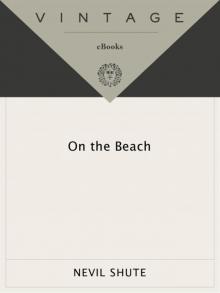 On the Beach
On the Beach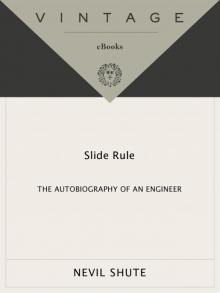 Slide Rule
Slide Rule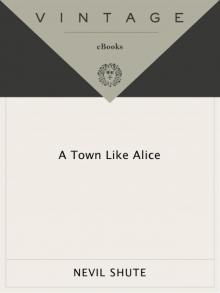 A Town Like Alice
A Town Like Alice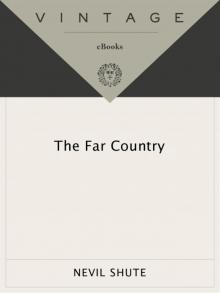 The Far Country
The Far Country Pied Piper
Pied Piper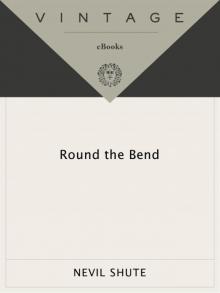 Round the Bend
Round the Bend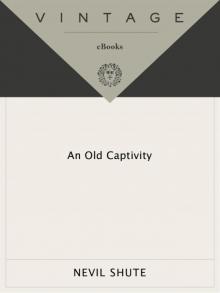 An Old Captivity
An Old Captivity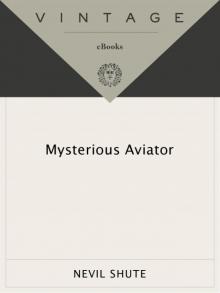 Mysterious Aviator
Mysterious Aviator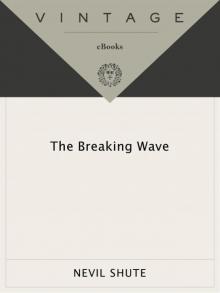 The Breaking Wave
The Breaking Wave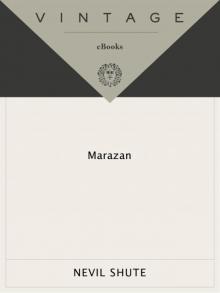 Marazan
Marazan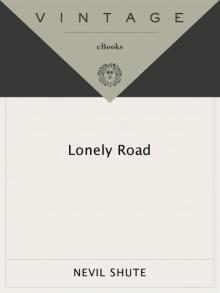 Lonely Road
Lonely Road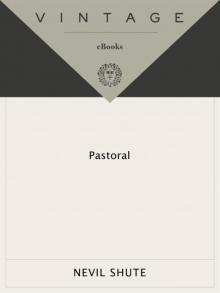 Pastoral
Pastoral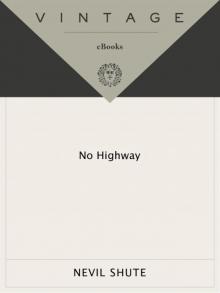 No Highway
No Highway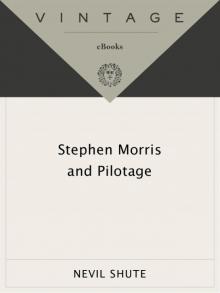 Stephen Morris and Pilotage
Stephen Morris and Pilotage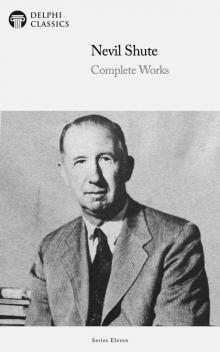 Complete Works of Nevil Shute
Complete Works of Nevil Shute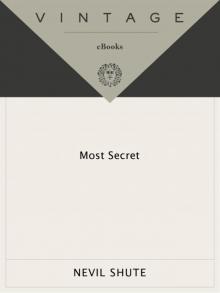 Most Secret
Most Secret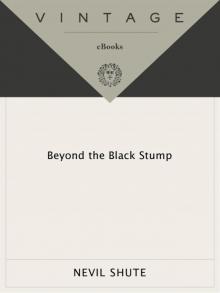 Beyond the Black Stump
Beyond the Black Stump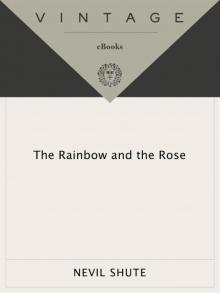 The Rainbow and the Rose
The Rainbow and the Rose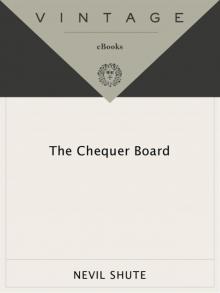 The Chequer Board
The Chequer Board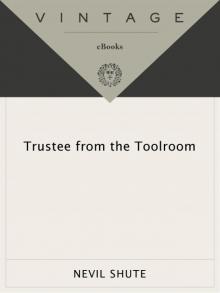 Trustee From the Toolroom
Trustee From the Toolroom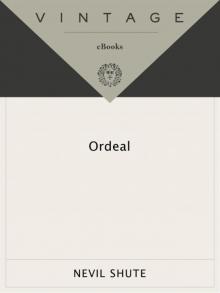 Ordeal
Ordeal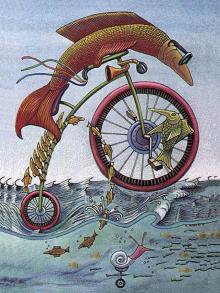 Stephen Morris
Stephen Morris